Campaign group Fuel Poverty Action took to parliament on 1 October. It was to hand in its #EnergyForAll petition signed by over half a million people. This calls for the guaranteed right to free energy to cover universal basic needs. Notably, the group coincided the hand-in with the day so-called energy regulator Ofgem was increasing the energy price cap, sending bills spiralling ahead of winter.
It marks the start of a winter of rising and unaffordable bills for millions of UK households.
‘Energy For All’: bills rising with the energy price cap
Ofgem has now implemented a higher energy price cap of:
£1,717 per year for a typical household who use electricity and gas and pay by Direct Debit. This is an increase of 10% compared to the cap set between 1 July to 30 September 2024 (£1,568).
This is lower than the same period last year – but means energy bills will rise on average by 10% – or £149 a year.
It also means energy bills will still be well above pre-pandemic prices. The 10% increase makes them them 65% higher than in 2020.
Campaigners are therefore warning that rising prices will cause many to switch off their heating and risk serious health problems this winter.
Jonathan Bean of Fuel Poverty Action said that:
this is extra money people can ill afford – especially the millions of low-income pensioners who will be plunged into fuel poverty as a result of Rachel Reeves axing winter fuel payments for two million pensioners who are already struggling.
A huge number of people will resort to turning off the heating and trying to survive in cold, damp homes. Many will end up in hospital, and thousands will die.
Of course, as the Canary has already highlighted, the energy price cap increase will hit marginalised households the hardest. In particular, the bill hike will hurt people who need a lot of energy, because the 10% rise only applies to the average household.
What really matters is how much the unit price – the amount per kilowatt hour of energy – the cost is going up by. In reality then, for some, bills will shoot up a lot more than this.
For instance, this will include chronically ill and disabled people who typically have greater energy needs for aids and equipment to help manage their conditions. Alongside this, people in less energy efficient housing will invariably pay more for their fuel costs as well. Naturally, many pensioners will also be among those with larger energy demands too.
Fuel Poverty Action take the petition to Parliament
It’s why Fuel Poverty Action launched its #EnergyForAll campaign. This demands that the government introduce a universal basic energy allowance called Energy For All. Specifically, as the petition itself stated:
#EnergyForAll means guaranteeing everyone enough energy, free – to cover the basics like heating, cooking, and lighting – to give us all the security we need, taking account of people’s actual needs related to their age, health, and housing.
To pay for this new pricing system, Energy for All, we’re urging the Government to introduce proper taxation on the profits of oil and gas producers, traders and suppliers, and to STOP subsidising fossil fuels with millions of pounds every day.
The group delivered these calls from over 662,000 people to parliament on Tuesday 1 October, with banners and placards:
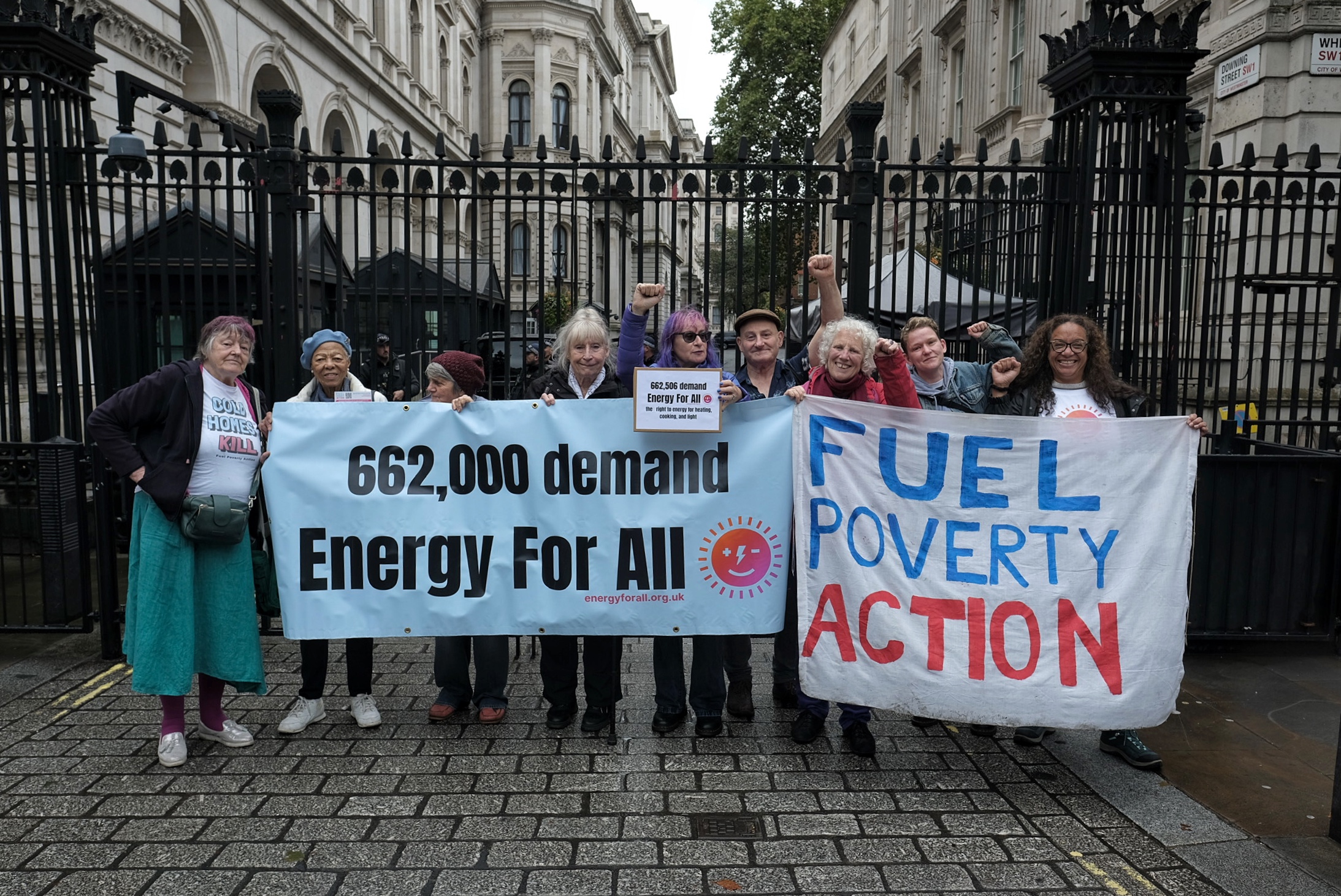
They took their message right to the prime minister’s front door:
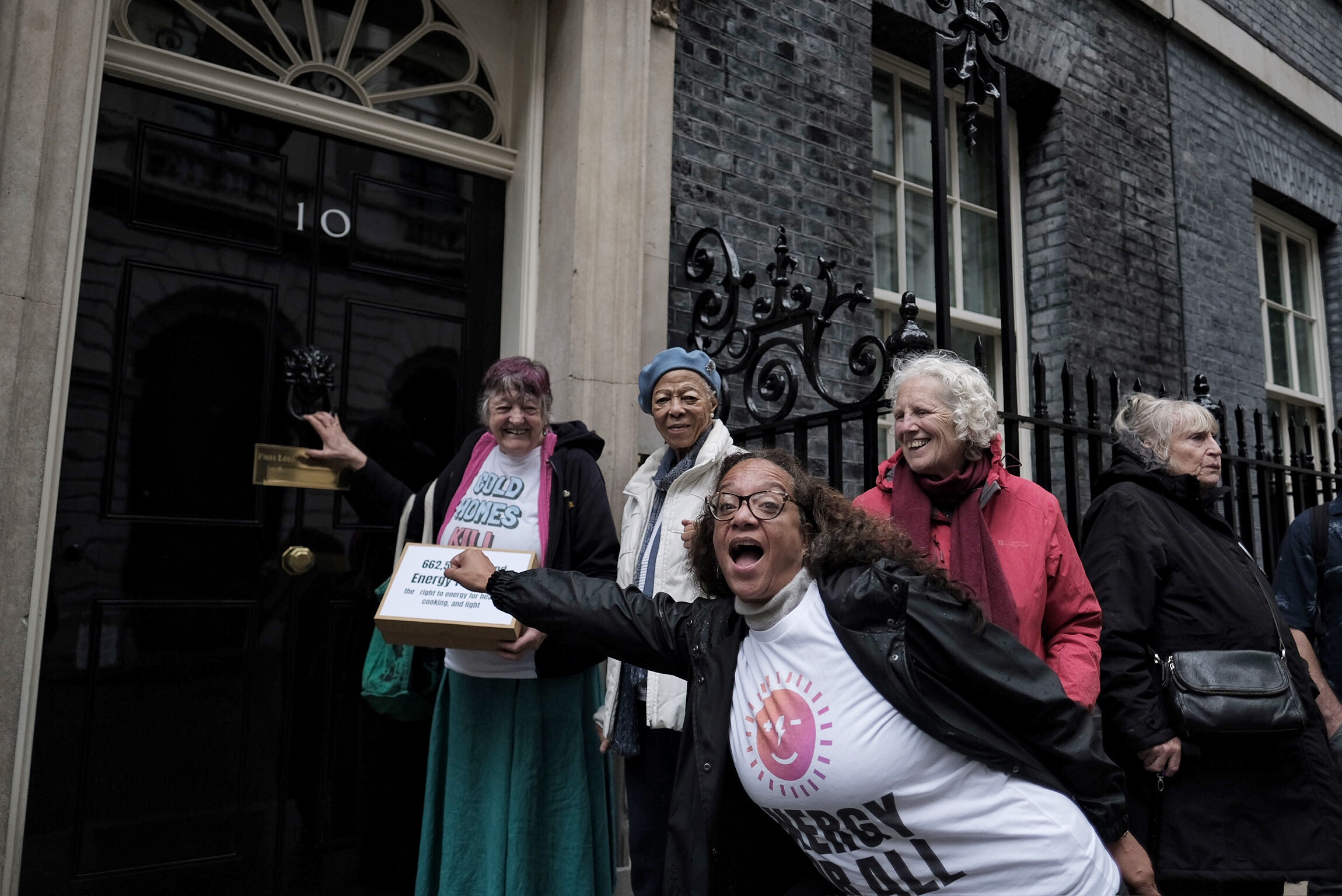
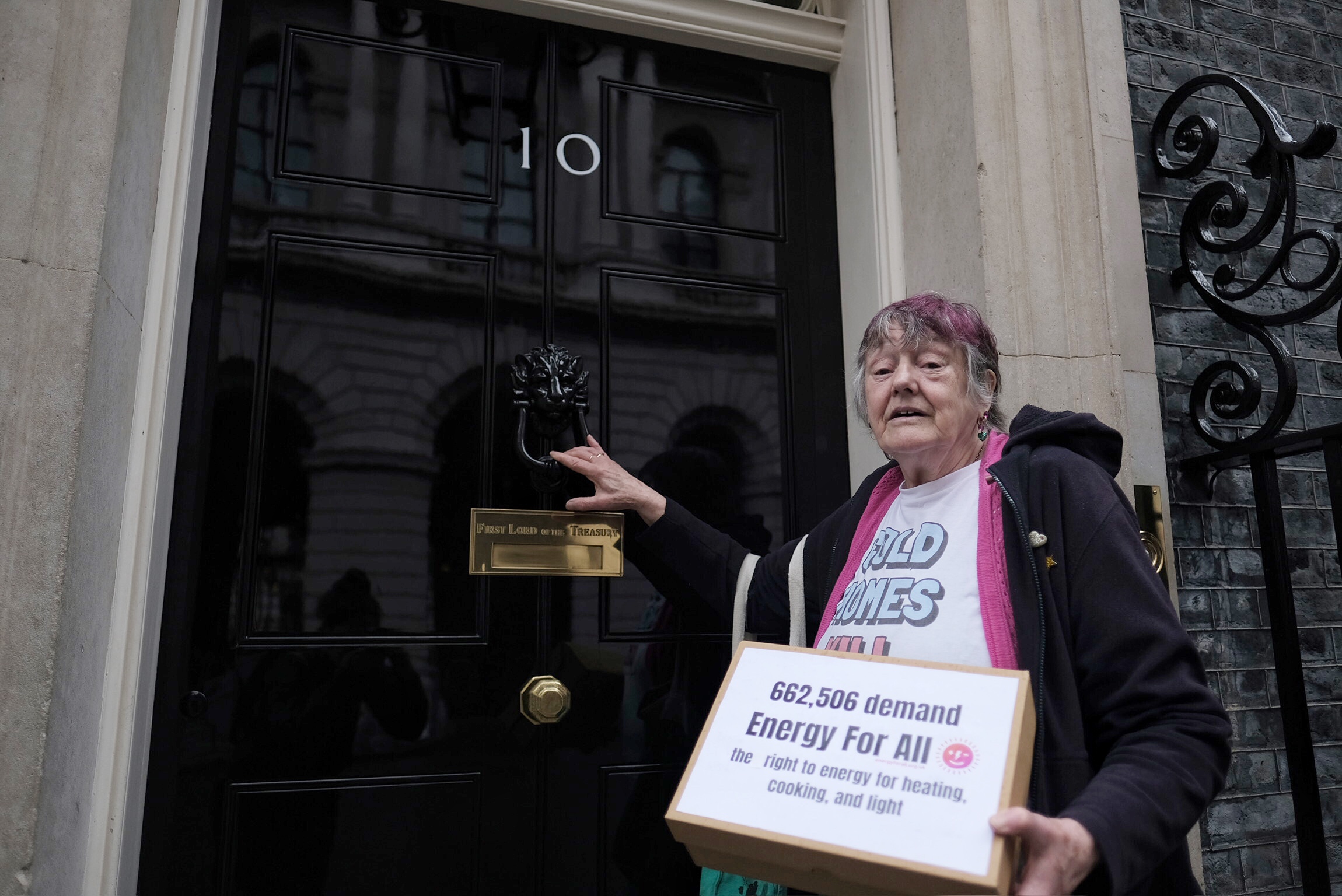
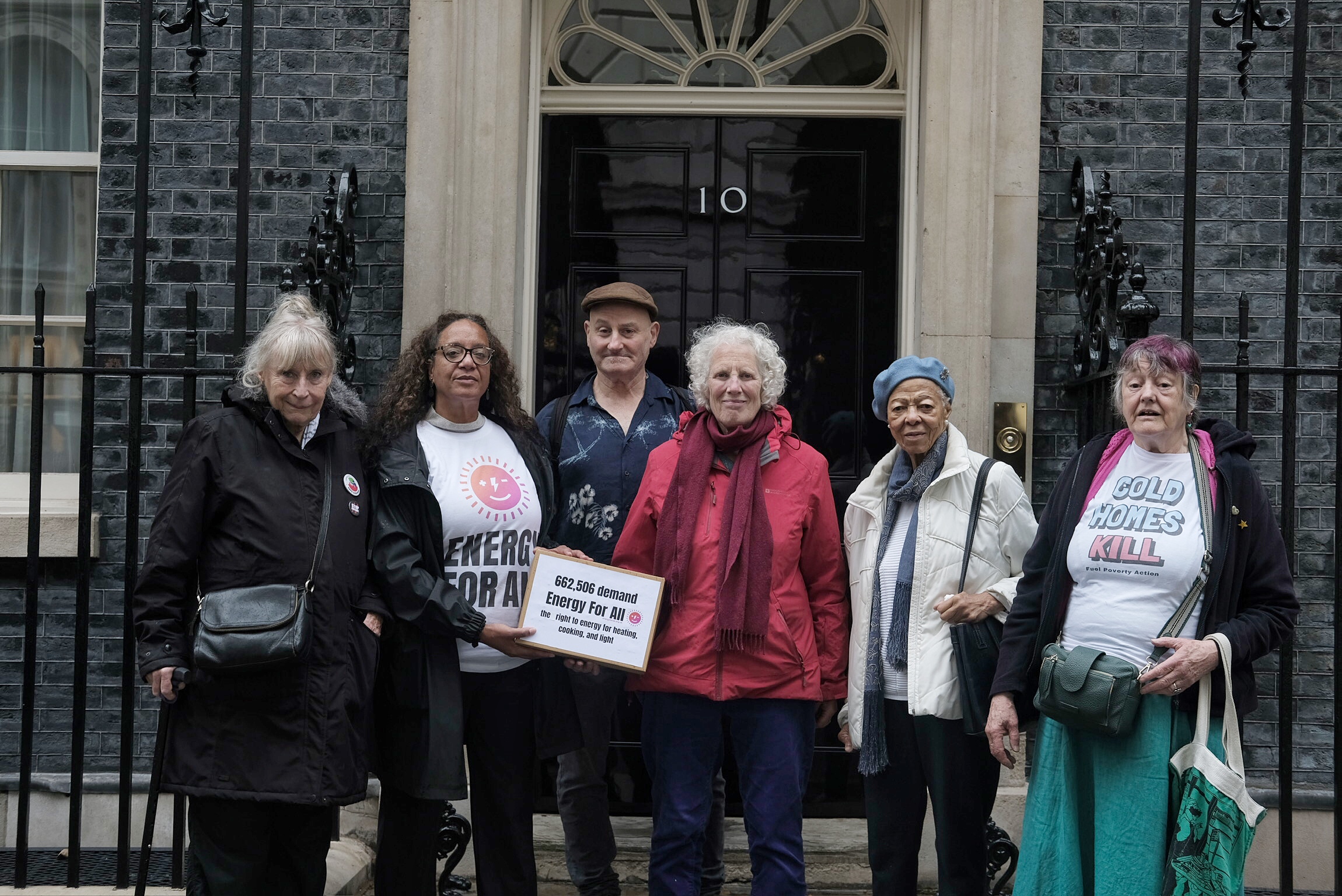
They also handed out information postcards to passers-by to keep building the momentum for these demands:
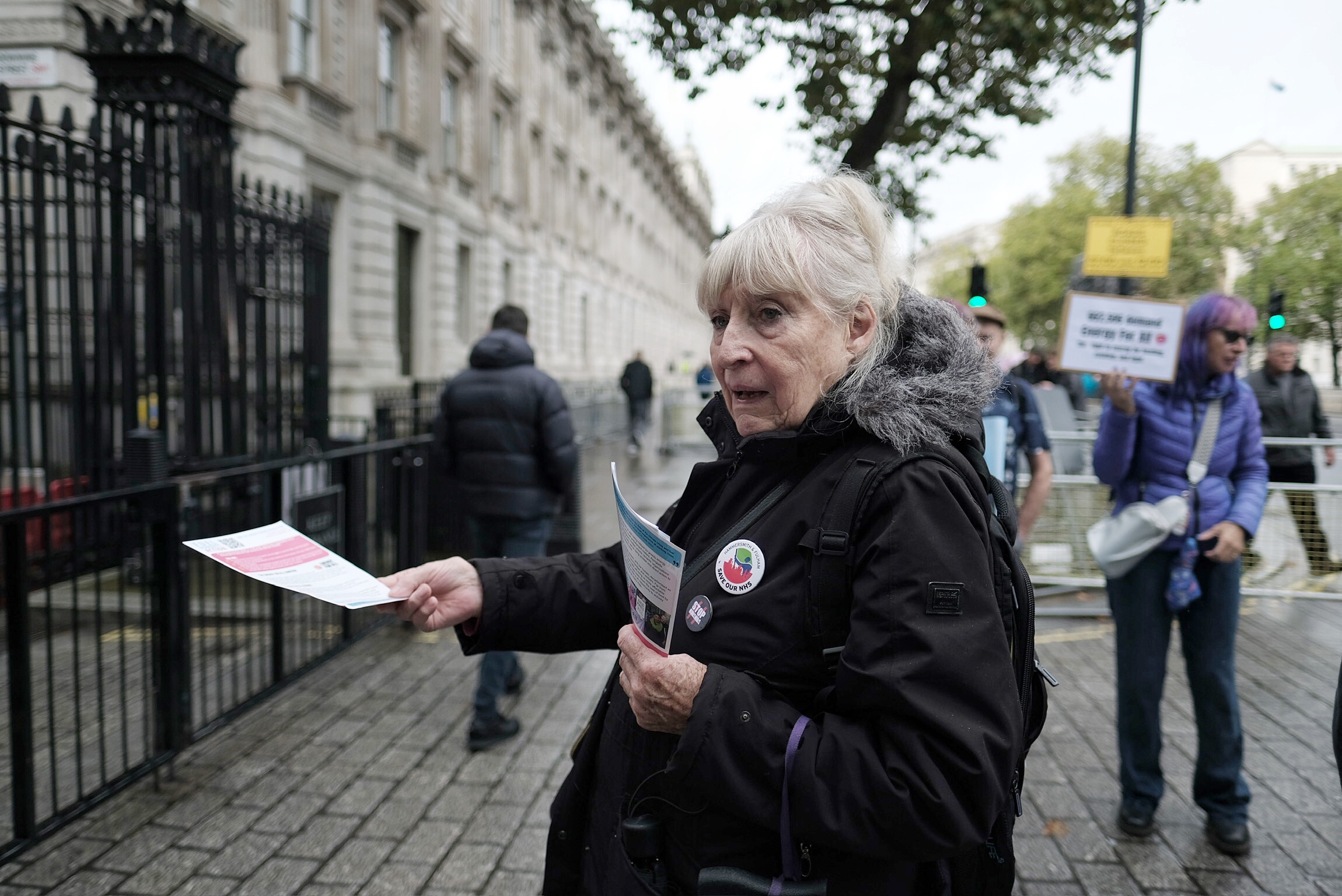
Meanwhile, over by parliament Unite Community and Unite London and East were also taking action. The group did banner drops to highlight rising energy costs:
Again on Westminster Bridge in London activists dropped the following banners which said
Cold Homes Kill
Fuel Poverty Action
Corporate Greed Kills
Energy For allThank you to everyone who took part today pic.twitter.com/YChd2OwvE1
— Paula Peters (@paulapeters2) October 1, 2024
Tax the rich companies profiteering off the energy price cap
Several groups campaigning for protections for pensioners this winter are also supporting the campaign.
General Secretary of the National Pensioners Convention Jan Shortt said:
Energy For All would mean that older people would have a level of energy for warmth, light, hot water and cooking without worrying about falling into debt.
Alongside this, Shortt highlighted that it could pay for this by properly taxing the profiteering fossil fuel companies and suppliers:
The petition calls for “proper taxation on the profits of oil and gas producers, traders and suppliers” and an end to “fossil fuel subsidies” of “millions of pounds every day.
Because, as the Canary’s James Wright has pointed out:
At the same time as the price hike, energy companies Iberdrola (owners of Scottish Power), Equinor, Centrica (British Gas), EDF and Drax alone have made £240bn in profit since 2020.
Despite this, as Wright also highlighted, Ofgem’s CEO has made out that the energy price cap hike is enabling these greedy companies to make a “small profit”. Instead, campaigners have argued the reality is that they are make eye-watering sums from the privatised energy racket.
Tommy Vickerstaff at 350.org therefore argued that:
Our energy system is broken and the government is dithering on fixing it. It’s currently focussed on lining the pockets of fossil fuel CEOs, but the solutions are clear.
We need an immediate extreme wealth tax to unlock millions of pounds for a renewable energy system to ensure everyone in the UK is guaranteed clean, reliable energy in our homes. In doing so we can both provide security and safety for UK households as well as advancing our international climate goals by minimising the impact the UK energy system has on communities around the world and on our planet.
An energy guarantee to keep people warm and safe this winter
As Green New Deal Rising’s head of campaigns Mel Kee expressed, their rampant profiteering off the back of the energy price cap will be at the public’s expense:
Our energy system must be run for the good of our communities, rather than to line the pockets of shareholders. Being able to heat our homes, or cook our meals should not be a luxury – these are basic needs.
This Government must show us they are serious about ‘change’ by improving ordinary people’s lives, not protecting energy giants’ profits.
In particular, campaigners honed in on the staggering profits of British Gas, which made over £750m in 2023 alone. They argued that Ofgem has “no excuse” for inaction to protect billpayers.
Fuel Poverty Action’s Jonathan Bean said of this:
Ofgem gave British Gas an extra £500 million in profits last year. So where is the action from the regulator to protect the most vulnerable?” asks Jonathan Bean of Fuel Poverty Action.
Given this, he also argued for the abolishment of cruel standing charges. These are the flat-rate daily charge suppliers levy on energy bills – regardless of energy usage. He said that:
One thing they can do right now is to abolish cruel standing charges, which see people up and down the country pay a charge just for the privilege of purchasing energy.
Imagine being asked for £6 each time just to enter the supermarket to do your weekly shop. Standing charges are inhumane.
The winter fuel payment was used by many pensioners to offset the high standing charges they face. With this protection gone, standing charges may force many more to turn off their heating, and millions on prepayment meters risk being cut off completely.
Fuel Poverty Action has also highlighted that Ofgem electricity prices are four times higher than gas prices. This exposes the 8% of households with only electric heating to higher bills, including older people with only storage heating and families in low-quality private rented homes.
Given this, the group is calling for removal of unfair government levies, and market reform so households benefit from cheap renewables. Therefore, Bean said:
The terrible human suffering and devastating impact on our NHS we will see this winter results from misguided government policy and energy firm profiteering”, says Bean.
We should instead be protecting everyone with an essential energy guarantee that keeps us all warm and safe this winter.
Featured and in-text images via Angela Christofilou




















